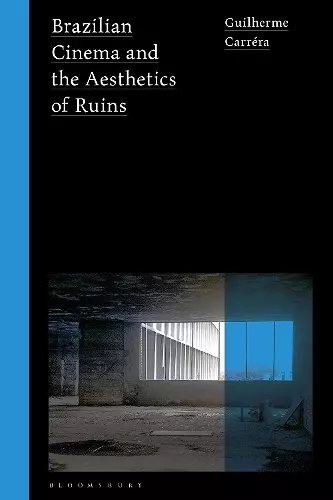Brazilian Cinema and the Aesthetics of Ruins
Format:Hardback
Publisher:Bloomsbury Publishing PLC
Published:16th Dec '21
Currently unavailable, and unfortunately no date known when it will be back

Brazilian Cinema and the Aesthetic of Ruins defines an aesthetics of ruins in contemporary Brazilian documentary. In examining the different ways in which ruins are portrayed, the book argues that these unconventional films articulate critiques of the notions of progress and (under)development in the Brazilian nation.
Winner of the British Association of Film, Television and Screen Studies (BAFTSS) 2023 Award for Best First Monograph.
Winner of the Association of Moving Image Researchers (AIM) 2022 Award for Best Monograph.
Guilherme Carréra’s compelling book examines imagery of ruins in contemporary Brazilian cinema and considers these representations in the context of Brazilian society. Carréra analyses three groups of unconventional documentaries focused on distinct geographies: Brasília - The Age of Stone (2013) and White Out, Black In (2014); Rio de Janeiro - ExPerimetral (2016), The Harbour (2013), Tropical Curse (2016) and HU Enigma (2011); and indigenous territories - Corumbiara: They Shoot Indians, Don’t They? (2009), Tava, The House of Stone (2012), Two Villages, One Path (2008) and Guarani Exile (2011). In portraying ruinscapes in different ways, these powerful films articulate critiques of the notions of progress and (under) development in the Brazilian nation.
Carréra invites the reader to walk amid the debris and reflect upon the strategies of spatial representation employed by the filmmakers. He addresses this body of films in relation to the legacies of Cinema Novo, Tropicália and Cinema Marginal, asking how these presentday films dialogue with or depart from previous traditions. Through this dialogue, he argues, the selected films challenge not only documentary-making conventions but also the country’s official narrative.
This is an intriguing walk amidst Brazilian ruins, from the outskirts of the capital to a Jesuit building in an indigenous area. By looking at those testimonies of underdevelopment, the author unfolds an extraordinary series of Brazilian singularities, but also illuminates our past, present and future in a neoliberal world. -- Albert Elduque Busquets, Universitat Pompeu Fabra, Spain
Brazilian Cinema and the Aesthetics ofRuins is useful to readers with a knowledge of World Cinema as well as to those who are less familiar with core Brazilian cinematic traditions and how they have sought to engage with problems of social inequality, poverty, and underdevelopment. Carréra’s dense, historically situated and in-depth examination of Brazilian social documentary films thus offers a more contemporary assessment of Brazilian filmmaking and sits alongside other English language books in the field. … [It] is a solid, well-researched, and developed book that will be very useful for students and scholars alike in disciplines from Film Studies to Brazilian and Latin American Studies, Politics, and Media and Communications. * Volupté *
This timely addition to existing scholarship in English on Brazilian cinema provides an original and persuasive argument for situating contemporary production within a wider aesthetics of ruin and decay. Both accessible and academically rigorous, this volume will appeal to students and established scholars alike. -- Lisa Shaw, University of Liverpool, UK
A densely synthetic and eminently readable capsule overview of Brazilian Cinema filtered through the imagistic-theoretical grid of “ruins” as a metaphor both for artistic creativity and social devastation. After the celebrated aesthetics of poverty, hunger, and garbage, the book offers a multi-faceted aesthetics of ruination, all in relation to larger themes of indigeneity and modernity. -- Robert Stam, New York University, USA
- Winner of BAFTSS (British Association of Film, Television and Screen Studies) Award for Best First Monograph 2023 (UK)
- Winner of AIM (Association of Moving Image Researchers) Best Monograph Prize 2022 (UK)
ISBN: 9781350203020
Dimensions: unknown
Weight: 718g
352 pages